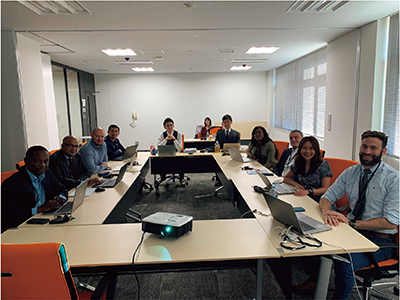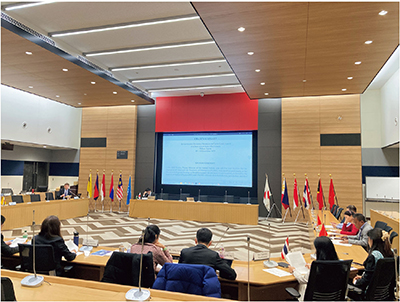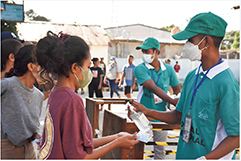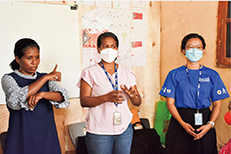(3) Technical Assistance for the Development of Legal and Judicial Systems and Assistance for Democratization
In order to achieve “quality growth” in developing countries, it is necessary to equip them with social infrastructure that is equitably and stably managed, so that the rights of individuals are guaranteed, and people can be engaged in socio-economic activities with a sense of safety. To strengthen such foundations in developing countries, the sharing of universal values, such as freedom, democracy, respect for basic human rights, and the rule of law, realizing good governance, and ensuring peace, stability, and security are of great importance.
In such circumstances, corruption cases involving public officials, such as bribery and embezzlement can also be a cause of impediments of the environment for fair competition and sound economic growth of developing countries. Therefore, it is necessary for donor countries to support good governance, including anti-corruption measures in developing countries to realize fair and stable societies.
It is also a critical component of encouraging medium- to long-term stability and development in developing countries to strengthen the foundation for democracy such as by the people’s participation in governance and development and by protecting and promoting human rights. In particular, it is important to support developing countries that take proactive steps toward democratization in their efforts to move toward democratic systems, such as through assistance for holding fair and transparent elections, and assistance for the media in ensuring the citizens’ right to know and protecting freedom of expression.
● Japan’s Efforts
■ Development of Legal and Judicial Systems
Japan actively provides assistance for the development of legal and judicial systems in order to establish the rule of law, realize good governance, promote and solidify democratization, and respect basic human rights in every country. Specifically, Japan provides assistance on legal and judicial system reform, drafting of laws and regulations, capacity development of national and local government officials for the operation and execution of legal systems, enhancement of internal audits, and establishment of civil codes, competition law, intellectual property law, taxation system, internal audit, and public investment systems in countries such as Bangladesh, Cambodia, Indonesia, Laos, Mongolia, Nepal, Sierra Leone, Sri Lanka, Timor-Leste, Uzbekistan, and Viet Nam. For instance, in Laos, as a result of Japan’s continuous support over more than 20 years for the development of legal and judicial systems, the country’s first civil code entered into force in May 2020, and support for the operation of the civil code continues to be provided, including the completion of the Commentary Book of the Civil Code in April 2023. In Indonesia, Japan promoted the preparation of a guidebook for judges outlining the contents of trademark and copyright laws, conducted training and seminars for judges in regional cities throughout the country, utilizing a collection of judgments (trademark cases edition) for judges dealing with intellectual property cases (published in 2022), and worked on the capacity building of legal practitioners in the country. Furthermore, Japan invited judges in the intellectual property field in May 2023, as well as government officials in charge of drafting and reviewing laws and regulations in September of the same year, for training to share Japan’s systems and experiences that could serve as a reference for the country.
Japan takes a leading role in the implementation of the “Kyoto Declaration”Note 48 adopted at the 14th UN Congress on Crime Prevention and Criminal Justice (Kyoto Congress)Note 49 held in Kyoto in March 2021. Specifically, Japan promotes the efforts to realize the “Kyoto Declaration” by leading the formulation of the “UN Standards and Norms on Reducing Reoffending” through using knowledge of reducing reoffending from Japanese public-private partnerships, and by regularly holding related forums, such as the “Global Youth Forum for a Culture of Lawfulness” (Col-YF), which aims to empower youth who will lead the next generation, and the “Criminal Justice Forum for Asia and the Pacific” (Crim-AP), an information-sharing platform for criminal justice practitioners in the Asia-Pacific region to further promote international cooperation to fight crime. In December 2022, the “2nd Global Youth Forum for a Culture of Lawfulness” was held. More than 100 youth from over 50 countries and regions participated and discussed the theme of “The Role of Youth in Achieving a Diverse and Inclusive Society.” In February 2023, the “2nd Criminal Justice Forum for Asia and the Pacific” was held, where participants from 18 countries and 5 organizations engaged in a lively exchange of views. Furthermore, in July, in conjunction with the ASEAN-Japan Special Meeting of Justice Ministers, Japan and the Thailand Institute of Justice (TIJ) co-hosted the “ASEAN-Japan Special Youth Forum for Promoting the Rule of Law,” with the support of UNODC. More than 60 youth from Japan, ASEAN member states, and Timor-Leste gathered to discuss the theme of “Building Justice Literacy for Enhanced Access to Justice – the Key to the Rule of Law in the Digital Era –.”
With regard to capacity building assistance for national and local public officials to operate and enforce legal and judicial systems, Japan conducts international training courses, studies, and local seminars, specifically with the aim of strengthening the development of human resources, such as legal practitioners. In 2022, as in 2021, Japan conducted online training while the new entry of foreign nationals to Japan was restricted due to the COVID-19 pandemic. But from autumn 2022 onwards, Japan gradually resumed face-to-face training domestically. Whether online or face-to-face, the training is conducted on topics such as drafting laws and legislation, improving operation of legal and judicial systems, and capacity building of relevant professionals, taking into account the needs of the above-mentioned countries, the latest national political situation, and the activities of international organizations such as the UN. The training was attended by legal practitioners and lawmaking professionals, including justice ministry officials, judges, and prosecutors from these countries. Additionally, as travel restrictions in various countries were eased or lifted, Japan gradually resumed participating in face-to-face seminars and workshops held locally and conducted training on similar topics.
In order to proactively promote assistance aligned with the needs of developing countries, Japan works to implement effective assistance by conducting broad and basic studies regarding the legal systems of the countries, and their interpretations and operations. As one of the efforts, since April 2022, Japan regularly holds the “Asia-Pacific Real Estate Legislation Study Group” as a forum for conducting comparative research on real estate legal systems in Cambodia, Indonesia, Laos, and the Philippines, and in October 2023, held the “11th Symposium on International Civil and Commercial Law.”
■ Assistance for Governance Including Anti-Corruption Measures

The 25th UNCAC Training Programme (Photo: UNAFEI)

The 17th GG Seminar (Photo: UNAFEI)
As a State Party to the United Nations Convention against Corruption (UNCAC) and through its cooperation with UNODC, the secretariat of the Convention, Japan is actively engaged in developing legal systems concerning the prevention of corruption and law enforcement operations, as well as in providing capacity building assistance to justice and law enforcement agencies.
Through the United Nations Asia and Far East Institute for the Prevention of Crime and the Treatment of Offenders (UNAFEI),Note 50 which is jointly operated by the Ministry of Justice of Japan and the UN, Japan conducts annual training programs and seminars for criminal justice practitioners in developing countries, such as in Asia and Africa, as part of legal technical cooperation and support for governance including anti-corruption measures.
As an example of a specific initiative, Japan has annually held a training course to support the criminal justice for anti-corruption since 1998, except for the year when it was canceled due to the spread of COVID-19. The training course is held with themes selected from the key issues of the UNCAC, and contributes to the sound development of the criminal justice system and the strengthening of cooperative relationships for preventing corruption in each country. In November 2023, the 25th UNCAC Training Programme on the main theme of “Effective Corruption Investigation Utilizing International Cooperation” was held. A total of 30 criminal justice practitioners from 25 countries participated in the training, including 5 participants from Ukraine.
Furthermore, Japan has held a seminar titled “Regional Seminar on Good Governance for Southeast Asian Countries (GG Seminar)” every fiscal year since 2007, except for the year when it was canceled due to the spread of COVID-19, with the objectives of supporting governance initiatives in Southeast Asian countries and contributing to human resources development in the area of criminal justice and anti-corruption. In December 2023, the 17th GG Seminar on the theme of “Protecting Judges, Prosecutors and Law Enforcement Officials from Undue Interference Including Bribery” was held face-to-face in Japan. It was attended by 19 criminal justice practitioners from 10 countries, namely 9 ASEAN member states (Brunei, Cambodia, Indonesia, Laos, Malaysia, the Philippines, Singapore, Thailand, and Viet Nam) and Timor-Leste.
UNAFEI’s activities are not limited to anti-corruption efforts, but also address important issues related to crime prevention and criminal justice in the international community. UNAFEI responds to the changing global society by holding training programs and seminars on these topics to criminal justice practitioners widely in developing countries around the world. For example, in 2023, various seminars and training were held face-to-face: the 180th International Senior Seminar on the theme of “Promoting Legal Aid for Offenders and Victims” was held from January to February, the 181st International Training Course on the theme of “Countermeasures against Transnational Organized Crime” from May to June, and the 182nd International Training Course on the theme of “Effective Support for Reintegration of Released Inmates – Toward Seamless Support for Employment, Housing and Medical Care” from September to October.
Featured Project 2
Timor-Leste
Conducting Elections during the COVID-19 Pandemic: Achieving both the Promotion of Participation in Politics and Infectious Disease Control
COVID-Resilient Elections in Timor-Leste Project
Contributions to Multilateral Institutions (March 2021 – July 2023)
Timor-Leste, one of the countries where democracy has taken deep roots in Southeast Asia, has actively promoted the participation of its people in politics since the restoration of independence in 2002. However, in the 2022 presidential election and the 2023 parliamentary election, which were to be held while COVID-19 was not yet under control, there were concerns about whether infectious disease countermeasures could be sufficiently taken under the country’s fragile medical system.
In response to the situation, Japan, in collaboration with the United Nations Development Programme (UNDP), strengthened the country’s resilience to infectious diseases in order to support the country in achieving equal, direct, and active participation in politics during the spread of COVID-19. In providing cooperation, consideration was given to promote the participation in politics of women, youth, and persons with disabilities, for the realization of an inclusive society.
In this cooperation, Japan supported the installation of handwashing stations in 13 regional offices of the Technical Secretariat for Electoral Administration and the National Commission on Elections. In addition, Japan prepared emergency response manuals, provided personal protective equipment, and conducted training for staff on infectious disease countermeasures. Furthermore, toward the realization of inclusive elections, Japan also supported the installation of facilities for persons with disabilities, such as ramps and accessible restrooms. Through dissemination of election information toward women, youth, and persons with disabilities, Japan promoted broader participation of people in politics.
At polling places on election day, face masks were distributed, and body temperature checks and hand sanitization were thoroughly conducted. There were no reports of COVID-19 infections during the election. Improvements to the facilities of election administrative institutions ensured that voters felt safe and satisfied, which led to participation in politics. Despite the spread of COVID-19, the voter turnout in the presidential election was as high as 77.26% and in the parliamentary elections in the following year it was 79.28%, with female voter turnout exceeding 80%, the highest ever.
Japan will continue to support Timor-Leste in achieving sustainable development and building a healthy democratic society.

A staff member at a polling place implementing infectious disease countermeasures for citizens who came to vote in the 2022 presidential election (Photo: UNDP)

A UNDP Japanese staff member working with sign language interpreters to support the dissemination of electoral information to persons with disabilities (Photo: UNDP)
■ Assistance for Democratization
In Kosovo, Japan has implemented the “Project for Capacity Development of Radio Television of Kosovo (RTK)” since January 2015 to deliver accurate, neutral, and fair broadcasting to all citizens. In order to improve the accuracy of reporting in multiethnic areas, Japan provides assistance for preparations of the opening of branch offices in ethnic minority areas and mixed ethnic areas, and for the capacity enhancement of program production staff through on-the-job training and workshops by JICA experts. These activities contribute to the broadcasting of fair and impartial programs to all citizens, including ethnic minorities.
- Note 48: An outcome document of the Kyoto Congress that provides medium- to long-term guidelines for the UN and UN Member States in the field of crime prevention and criminal justice.
- Note 49: The largest UN international conference in the field of crime prevention and criminal justice, held once every five years. UNODC serves as the secretariat of the conference.
- Note 50: Established in 1962 based on an agreement between the UN and the Government of Japan. It is operated by the UN Training Cooperation Department of the Research and Training Institute within the Ministry of Justice. It has produced over 6,300 graduates from 142 countries and regions since its establishment.
